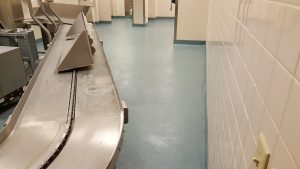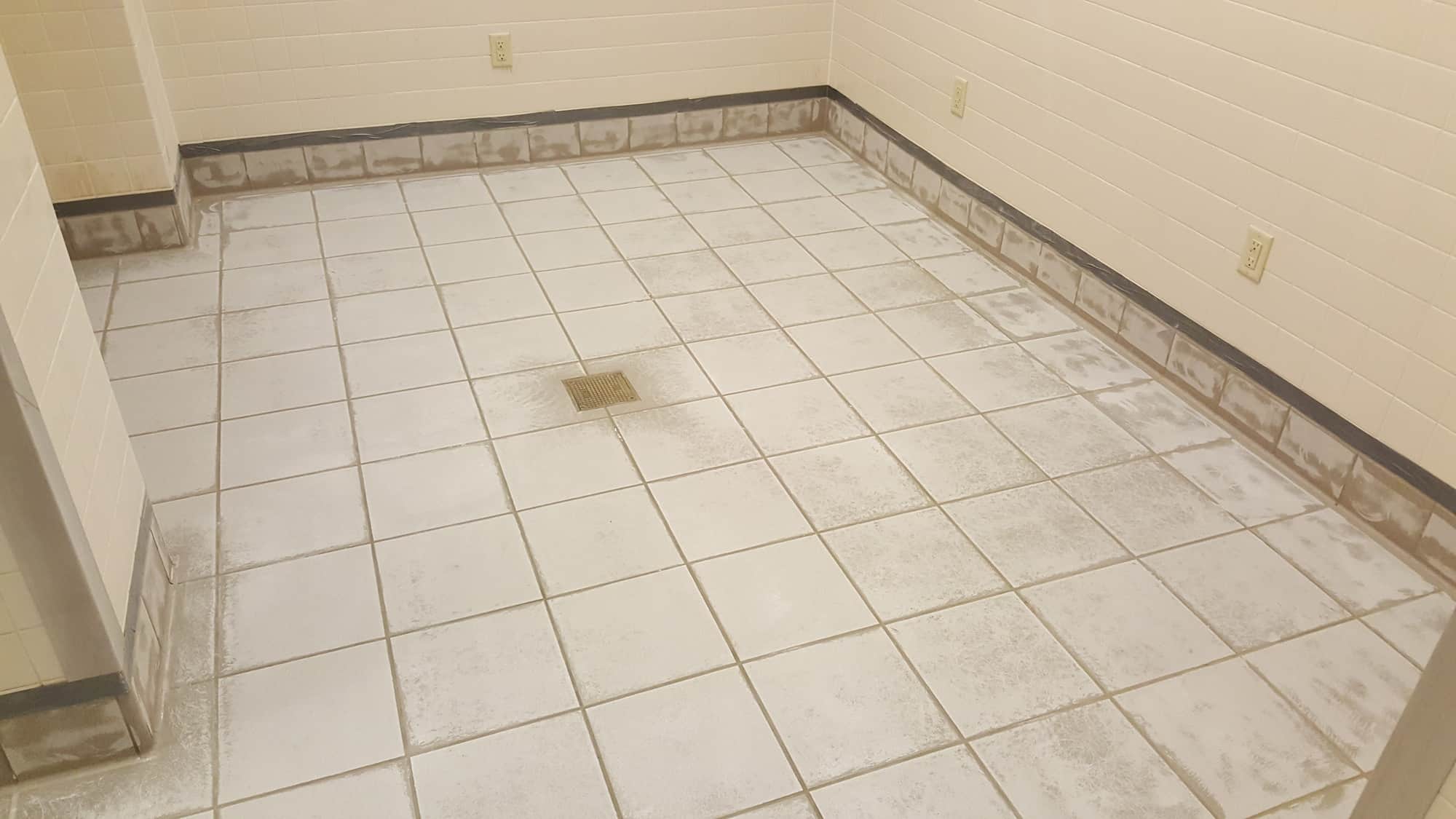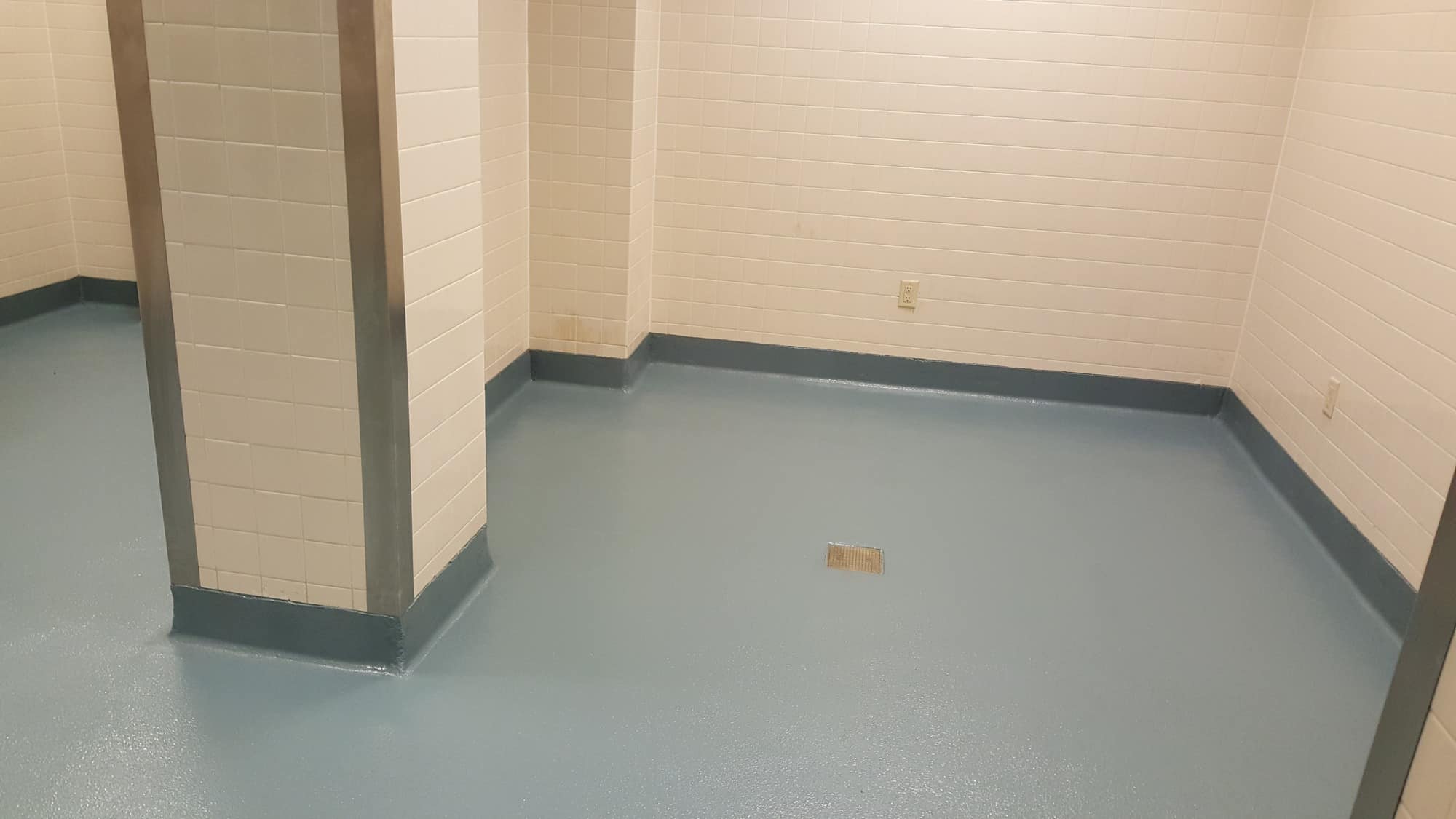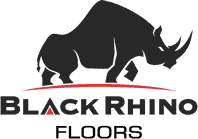Key Items for Commercial Kitchen Flooring
What you need to know for your next commercial kitchen floor. CONTACT US OR GET A QUOTECommercial Kitchen Floors
 When you need to install or redo a commercial kitchen floor, you need to keep health inspectors, OSHA, employees, and your pocketbook happy all at the same time! If your kitchen is visible to clients, you have the additional challenge of making your floor look good as well. So, let’s quickly cover the basics and then let’s talk about what your best options for flooring would be. Feel free to jump to the section you need most.
When you need to install or redo a commercial kitchen floor, you need to keep health inspectors, OSHA, employees, and your pocketbook happy all at the same time! If your kitchen is visible to clients, you have the additional challenge of making your floor look good as well. So, let’s quickly cover the basics and then let’s talk about what your best options for flooring would be. Feel free to jump to the section you need most.

Commercial Kitchen Flooring Considerations
What Health Inspectors and OSHA Want in a Commercial Kitchen Floor
This thought may surprise you, but the government wants to keep people healthy! Basically, we all want those who eat your food to not get sick and your employees to avoid injuries. In other words, sanitation and non-slip floors are key.
When we talk about sanitation and your floors, we are focused on eliminating places for pathogens to hide and breed. Any time there are porous surfaces or areas hard to clean, such as cracks or hard to reach corners, you open up opportunities for pathogens to create a home for themselves.
One issue that catches people is, what once starts as a sanitary floor can break down into an unsanitary floor after years of use. It used to be that tile was a common installation in many commercial kitchens.
- What happens when a heavy pot drops on a tile? A crack forms.
- What happens with years of traffic? The sealant on the grout breaks down exposing the porous surface of the grout.
- What happens to the floor from the thermal cycling (continually cycling hot and cold, day after day) combined with high amounts of moisture and oils in the air and on the floor? The grout starts to break down entirely, and the tiles can even become loose.
So, ideally, we install a floor that will last for many years without cracking or exposing porous surfaces, a floor that does not break down with thermal cycling, moisture, or oils, a floor that does not crack when impacted with heavy objects. Yet, we are not through!
You also need a floor that is slip-resistant, even when wet. It is in everyone’s best interest to keep your employees from slipping on your floors. The hard part is a very slip-resistant floor can be hard to clean, but the good news is you can customize the balance between slip-resistance and how easy it is to clean with the right flooring material.
On a final note, you want a good floor-to-wall cove base which means a continuous floor up the first few inches of the wall. Ideally, the cove base and the floor will be one continuous material, with an easy to clean angle, and coming up several inches onto your wall. Check your local health code to know exactly how high your cove base should be. With a good floor-to-wall cove base, you will easily be to take a mop and clean the edge where your floor and wall meet.
So again, the various government agencies you may encounter want people to stay healthy. Good commercial kitchen flooring is going to play an essential part in achieving that goal.
Looking to help your hospitality and restaurant floors resist stains and look great!
What Employees Want in a Commercial Kitchen Floor
We talked about the non-slip issue above but remember non-slip versus easy to clean are competing trade-offs. If the food slides right off the floor…so might your employees! There are some flooring options that do better at being both easy to clean and slip-resistant, but be sure you ask about BOTH qualities when shopping around for your flooring.
One consideration about cleanliness is that it should be easy enough to spot dirt on your floor without making it too easy to spot dirt. We would generally recommend against a high gloss white floor like you would find in a medical-grade clean-room because every little speck of dust will show like a beacon a mile away and your employees may become frustrated feeling like the floor is never clean. Most people also avoid color patterns that hide dirt on the floor because hiding the dirt defeats the purpose of having a sanitary floor in the first place. Try lighter colors with a lower gloss to reach a balance of keeping things clean without driving your employees nuts.
To be easy to clean, your floor should generally let go of any food with normal, everyday, commercial floor cleaner. Some floors will also need to withstand the additional rigors of cleaning with a pressure washer. Know how you will generally clean your floor before you make your final flooring option.
What Customers Want in a Commercial Kitchen Floor
Yes, your customers want you to have a sanitary and safe floor…but there is something more.
If you have a commercial kitchen that is visible to customers, it can change the feel of your establishment if you move your floor from drab to fun. You can add decals or patterns to your floor that will make your floor look absolutely stunning.
Since the cost of having a cool looking floor is often just a small amount more than an utilitarian floor, why not make it fun? Not only will your customers appreciate your attention to detail throughout the entire facility, but you will create a work environment your employees will appreciate more when the kitchen floor is more than utilitarian gray.
What You Want in a Commercial Kitchen Floor
On top of meeting everyone’s needs above, you want your floor to cost less. Not only do you want a low install cost, you also want the lowest lifetime cost for your floor.
An easy to clean, slip-resistant floor saves you money. Employees take less time to clean the right floor where food just pops right off. Employees can also physically move faster on a slip-resistant floor, but they have to move slowly on surfaces they know can become slick.
You want to account for the installation cost. If you haven’t even built your facility yet, you can specify your floor type before the building goes up, which is obviously ideal. If you already have a building up, even a brand-new building, you already have limits in place with what you can do.
If you are going to install a new commercial kitchen floor in a current facility, you have other considerations. Can you repair and coat the current floor, or do you need a whole new floor? Generally, if you have a concrete or a ceramic tile floor, you can easily repair and coat the floor. If you are starting with a hardwood floor, there are going to be a lot more costs.
Not only do you have to pay installers, but how long will your kitchen be shut down to install the floor? Will you have to pay to move equipment out and pay to store equipment for a few days or can your installers work around the equipment where it sits?
Then there are ongoing costs. Do you need special cleaners for your floor? Can your floor handle your floor cleaners of choice? What is the optimal floor for mopping, automatic scrubbers, or your other favorite floor cleaning method? Do you have to shut down the kitchen to recoat your floor every one or two years? Does the floor resist damage or break down with impacts and years of use? Is the floor easy to repair if damage does occur?
Is your floor impact-resistant so when the knife or pot falls, you don’t have a floor problem on your hands? Is your floor scuff resistant because when granular ingredients fall on the floor to get trampled underfoot or by cart wheels, the food can act like sandpaper on your floor?
You get the picture. You would hate to save a penny on installation to waste a ton of money year-over-year with higher labor costs and higher maintenance costs.
Commercial Kitchen Flooring Options
It does not matter if you are starting from scratch or you are repairing an old commercial kitchen floor, there are a ton of choices for your floor, but there are only two good options that we generally recommend. Rather than covering all of your options, we will cover just these two best options.
Both options:
- Resist breaking down from fats, grease, or chemicals
- Are slip resistant
- Are moisture resistant
- Are impact and puncture-resistant
- Withstands extreme weight loads
- Resists bacteria growth with an anti-microbial additive
- Exceeds ADA and OSHA recommendations
Urethane Commercial Kitchen Floor Coatings
The most common choice is a urethane floor coating, and it is fast replacing epoxy coatings in commercial kitchen applications. Urethane meets all the needs we specified above plus it gives you almost endless design options. You can stain concrete below the floor or add color to make a variety of patterns. You can also add decals to the floor below the urethane coating for a truly unique floor.
Urethane Mortar Commercial Kitchen Floor Coatings
When there are a lot of cracks to fill or damage to the floor or if you have a floor that will see a lot of heavy traffic (like forklifts), a urethane mortar system may be ideal for you. Rather than just a top coating, the urethane mortar will add a full 1/8 – 3/8” of material on top of your current floor.
The urethane mortar system hides any floor imperfections and enhances the overall strength of your floor. You still get a ton of options of how your floor can look and an overall superior floor, but the mortar systems take longer to install and have a higher installation cost.
A Solution to Keep Your Tile or Stone
If you absolutely love the tile or stone you have now, there is a way to eliminate porous surfaces, make it more slip resistant, and make it more resilient. We have a product that is essentially liquid glass that can coat most current floors that are in good condition.
This product has been successfully installed in hospital surgical rooms where sanitation and slip-resistance are both a very high priority. We love this product, but it does require reapplication every one-to-two years. The good news is the application is as easy as applying a no-buff wax. You just ensure your floor is well cleaned, apply it to the floor, and give it a few hours to cure.
While this solution may have a slightly higher maintenance cost than the urethane we generally recommend, the cost is offset by avoiding a new floor installation, and it may be the right choice for you.
Other Flooring Considerations
- Be sure to test your floor for moisture coming from the outside or underneath your floor. You can have the best floor on top, but moisture from below can still have a negative long-term effect on your flooring.
- Make sure you have a well-trained crew for installation. At Black Rhino, we go beyond the free training offered by flooring equipment manufacturers, instead choosing the highest quality and most up-to-date training available. If you get an installation crew that gets your installation 99% right, you could still end up with a bad floor in just a few years.
If you are in Wisconsin or the Chicagoland area, we would love you to call Black Rhino Floors for a quote on your commercial kitchen flooring. We would be happy to serve you, and we win most of the jobs we quote for good reasons.
Contact us for a free consultation today
